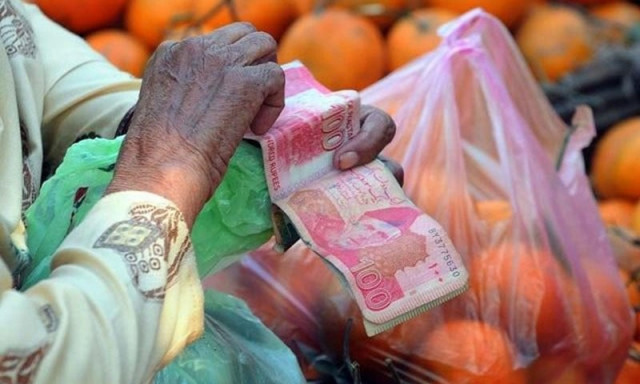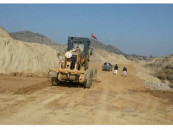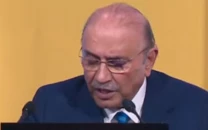Genie of inflation ready to devour all
People’s everyday lives being affected by increasing prices

Abdul Waheed, who lives on the outskirts of Islamabad, has spent years working two jobs to support his family living back in his village in Khyber-Pakhtunkhwa. Now a 46-year-old, he feels that even two jobs are not enough as he is facing difficulties in sending monthly ration to his family amid the runaway inflation.
He said he was finding it extremely difficult to afford fuel for his motorcycle, which had jumped from roughly Rs2,500 per month to almost Rs5,000.
Measuring inflation through the lens of essential items like cooking oil, he recalled, five litres of cooking oil would cost Rs850 in 2018; then it was available for Rs1,950 before the PML-N came to power and three days ago, it was being sold for Rs2,750.
Waheed is not alone as a large chunk of the country’s population is dealing with inflation every day when they buy groceries or fuel and pay more for just about everything.
The soaring inflation is painful and inescapable for the people. On Friday, the Pakistan Bureau of Statistics (PBS)’s Sensitive Price Indicator (SPI) put a stamp on what the common man has been feeling. The SPI for the week that ended on June 16 recorded an increase of 3.38%.
The PBS also disclosed that the year-on-year trend depicted an increase of 27.82% in inflation.
Apart from the ordinary people, the spiralling inflation has simultaneously become a nightmare for the successive governments that have failed to control it.
Even the State Bank of Pakistan (SBP), which was recently tasked to control inflation, could not ease the misery of the common man.
“The pain would be eased as soon as external account is stabilised, reserves stop decreasing and the exchange rate is steady,” eminent economist Dr Waqar Masood said.
Dr Masood, who has served as the federal secretary for finance division as well as SAPM on finance and revenue, said inflation was a global phenomenon. He added that the country’s energy prices were all based on imports and leading inflationary pressures.
“All these steps have been taken for the revival of IMF [International Monetary Fund] programme to curb the rot gripping the economy.”
Financial analyst Dr Farrukh Saleem listed two reasons for the inflation: First, the increase in oil prices in the international market and secondly, Pakistan’s reliance on imported oil.
“The prices of vegetables, meat and everything else increases because the country imports 90% of its oil.”
Dr Saleem described the situation as a double-edged sword, adding that it seemed difficult to escape it. He pointed out that increasing income was a solution but Pakistan will simultaneously have to keep the IMF happy.
The IMF, reportedly, not only wants a reversal of cut in the income tax rates for the salaried-class people but is seeking to pass on an additional burden of Rs125 billion on them.
Dr Saleem did not find it appropriate to put the entire blame on the central bank, saying the SBP only used monetary instruments to control inflation and could increase interest rate at the most.
“Pakistan is the only country buying expensive oil and selling it cheap,” he said, adding that this practice could have led to default.
“However, that has been averted,” he said, explaining that the investors’ wisdom changed by May 27 as they started buying Pakistan’s international bonds and that averted the potentially disastrous default.
Read ‘Ill-planned’ budget will unleash new wave of inflation: PTI
The incumbent government, while being in the opposition just a few months ago, had frequently criticised the PTI-led government and vowed to turn things around after coming to power -- a promise that it had failed to live up to.
Taking stock of the situation, PTI chairman and deposed premier Imran Khan lambasted the coalition government and invited the nation to take to streets and hold peaceful demonstrations on Sunday against inflation.
Imran, while calling the government incapable of handling the economy, warned that inflation would soar even higher in days to come if the nation kept sitting idly.
In a statement, PTI Central Secretary General Asad Umar also lashed out at the government for plunging the country into the quagmire of problems, saying its incompetence and flawed policies had created the “worst-ever” problems for Pakistan as its foreign reserves were fast depleting and rupee was losing its value at an alarming pace.
The PTI secretary general warned that the massive surge in the fuel prices would trigger a storm of inflation, which would further compound the miseries and hardship of the people.
He said the abysmal performance of the incumbent government could be judged from the fact that SBP foreign exchange reserves had fallen below $9 billion with a fall of another $240 million last week.
Among other things, Umar asked: “Who is going to take responsibility?”, fearing the power tariff would further increase due to the expensive energy plants running on imported fuel oil, which could further push the inflation upwards.
To overcome the nightmare of inflation, the government is largely hoping that financial help would arrive from IMF and friendly countries, and the Russia-Ukraine war would get over soon. Apart from pinning hopes on others, the only other thing that the government is doing at the moment is to urge public to adopt austerity measures while it is on a streak of increasing petroleum prices.
Federal Minister for Information Marriyum Aurangzeb was asked for comments but they did not come till the filing of this story.



















COMMENTS
Comments are moderated and generally will be posted if they are on-topic and not abusive.
For more information, please see our Comments FAQ